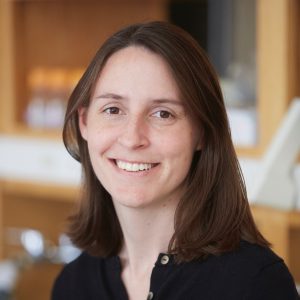Lecture 1.4
Title: Invited Lecture — Measuring and Controlling Gene Expression Dynamics in Single Bacteria
Lecturer: Prof. Mary Dunlop
Lecturer Website: http://www.dunloplab.com/
Lecturer Email: mjdunlop@bu.edu

Dr. Mary Dunlop is an Associate Professor of Biomedical Engineering at Boston University with additional appointments in Bioinformatics and in the Molecular Biology, Cell Biology & Biochemistry program. She graduated from Princeton University with a B.S.E. in Mechanical and Aerospace Engineering and a minor in Computer Science. She then received her Ph.D. from the California Institute of Technology, where she studied synthetic biology with a focus on dynamics and feedback in gene regulation. As a postdoctoral scholar, she conducted research on biofuel production at the Department of Energy’s Joint BioEnergy Institute. Her lab engineers novel synthetic feedback control systems and also studies naturally occurring examples of feedback in gene regulation. In recognition of her outstanding research and service contributions, she has received many honors including a Department of Energy Early Career Award, a National Science Foundation CAREER Award, and the ACS Synthetic Biology Young Investigator Award. She is also the recipient of several teaching awards, including Boston University’s Biomedical Engineering Professor of the Year Award (2019) and the College of Engineering Teaching Excellence Award (2020).
Title: Measuring and Controlling Gene Expression Dynamics in Single Bacteria
Abstract: Cell-to-cell heterogeneity in gene expression and growth can have critical functional consequences, such as determining whether individual bacteria survive or die following antibiotic exposure. In this talk, I will describe experiments using single-cell time-lapse microscopy to measure gene expression and growth in Escherichia coli, focusing on genes related to stress response. In support of this, I will describe our recent advances in automated image processing of time-lapse microscopy images using a deep learning model (DeLTA). Once trained, this algorithm requires minimal input from the user and can rapidly segment, track, and reconstruct lineages for bacteria growing in microfluidic chips and on two dimensional surfaces.
Suggested Reading or Key Publications:
Links to Relevant Software:
- e
- f
- g
- h
Professor Dunlop’s invited lecture has been recorded, but is only available to individuals upon request. If you would like access to the recording of her lecture, please contact the UQBIO organizers at qbio_summer_school@colostate.edu.
- Question 1
- Question 2